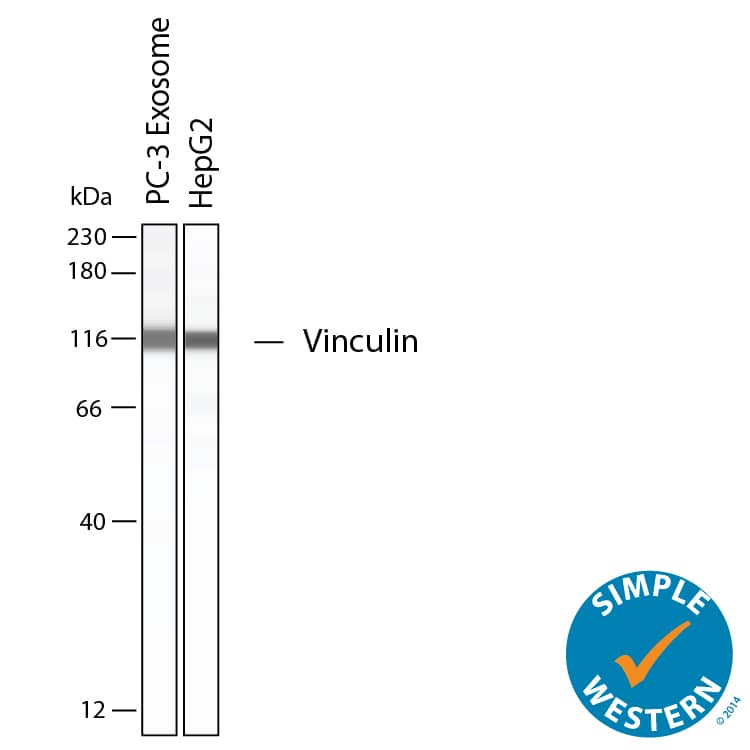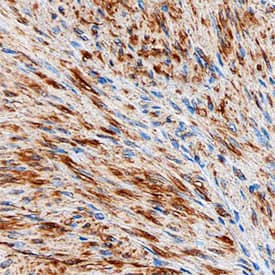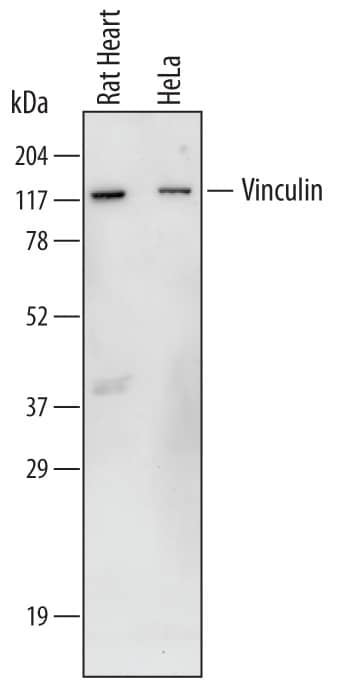Human/Rat Vinculin Antibody
R&D Systems, part of Bio-Techne | Catalog # AF6896

Key Product Details
Species Reactivity
Applications
Label
Antibody Source
Product Specifications
Immunogen
Lys1020-Gln1134
Accession # P18206
Specificity
Clonality
Host
Isotype
Scientific Data Images for Human/Rat Vinculin Antibody
Detection of Human and Rat Vinculin by Western Blot.
Western blot shows lysates of HeLa human cervical epithelial carcinoma cell line and rat heart tissue. PVDF membrane was probed with 1 µg/mL of Sheep Anti-Human/Rat Vinculin Antigen Affinity-purified Polyclonal Antibody (Catalog # AF6896) followed by HRP-conjugated Anti-Sheep IgG Secondary Antibody (Catalog # HAF016). A specific band was detected for Vinculin at approximately 120 kDa (as indicated). This experiment was conducted under reducing conditions and using Immunoblot Buffer Group 1.Detection of Human Vinculin by Simple WesternTM.
Simple Western shows lysates of Exosome Standards (PC-3) (NBP2-49856) and HepG2 human hepatocellular carcinoma cell line, loaded at 0.5 mg/ml. A specific band was detected for Vinculin at approximately 119 kDa (as indicated) using 10 µg/mL of Sheep Anti-Human/Rat Vinculin Antigen Affinity-purified Polyclonal Antibody (Catalog # AF6896). This experiment was conducted under reducing conditions and using the 12-230kDa separation system.Vinculin in Human Uterus.
Vinculin was detected in immersion fixed paraffin-embedded sections of human uterus using Sheep Anti-Human/Rat Vinculin Antigen Affinity-purified Polyclonal Antibody (Catalog # AF6896) at 3 µg/mL overnight at 4 °C. Before incubation with the primary antibody, tissue was subjected to heat-induced epitope retrieval using Antigen Retrieval Reagent-Basic (Catalog # CTS013). Tissue was stained using the Anti-Sheep HRP-DAB Cell & Tissue Staining Kit (brown; Catalog # CTS019) and counter-stained with hematoxylin (blue). vView our protocol for Chromogenic IHC Staining of Paraffin-embedded Tissue Sections.Applications for Human/Rat Vinculin Antibody
Immunohistochemistry
Sample: Immersion fixed paraffin-embedded sections of human uterus subjected to heat-induced epitope retrieval using Antigen Retrieval Reagent-Basic (Catalog # CTS013)
Simple Western
Sample: Exosome Standards (PC-3) (Catalog # NBP2-49856) and HepG2 human hepatocellular carcinoma cell line
Western Blot
Sample: HeLa human cervical epithelial carcinoma cell line and rat heart tissue
Formulation, Preparation, and Storage
Purification
Reconstitution
Formulation
*Small pack size (-SP) is supplied either lyophilized or as a 0.2 µm filtered solution in PBS.
Shipping
Stability & Storage
- 12 months from date of receipt, -20 to -70 °C as supplied.
- 1 month, 2 to 8 °C under sterile conditions after reconstitution.
- 6 months, -20 to -70 °C under sterile conditions after reconstitution.
Background: Vinculin
VCL (Vinculin; from the Latin vinculum denoting a union or connection) is a 115-120 kDa cytoplasmic member of the vinculin/ alpha-catenin family of proteins. The VCL gene is ubiquitously expressed and generates a series of globular domains whose N-and C-terminal globular regions self-associate to generate an inactive molecule. When at least two ligands bind to the molecule, it opens up, allowing for the formation of multiple complexes that impact both signaling and cell structure. Among other things, VCL is known to regulate the expression of E-cadherin, and to connect actin to integrins via talin. Human VCL is 1134 amino acids (aa) in length, and at this size, is commonly known as metavinculin. It contains an 835 aa N-terminal globular head that binds talin, beta- and alpha-catenin, followed by a Pro-rich linker segment (aa 836-878) and a 27-29 kDa C-terminal tail that binds lipids plus paxillin and PKC alpha (aa 879-1134). At least seven utilized phosphorylation sites exist. There are three potential splice variants. One shows a deletion of aa 916-983 and is called vinculin. A second contains an alternative start site at Met74, and again possesses a deletion of aa 916-983. A third shows a 34 aa substitution for aa 262‑1134. Over the range of aa used as the immunogen for this reagent (aa 1020-1134 in metavinculin; 952-1066 in vinculin), human and mouse VCL are identical in aa sequence.
Long Name
Alternate Names
Gene Symbol
UniProt
Additional Vinculin Products
Product Documents for Human/Rat Vinculin Antibody
Product Specific Notices for Human/Rat Vinculin Antibody
For research use only


